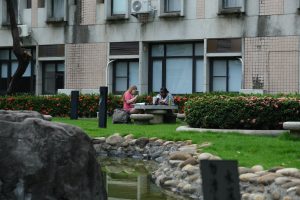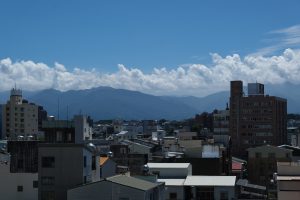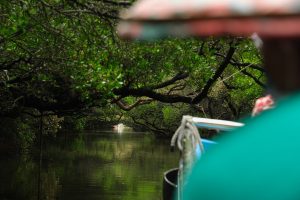
Throughout this summer, The Daily Mississippian is publishing dispatches from our staffers about their vacation and study abroad experiences.
University of Mississippi Chinese Flagship students studied abroad in Taiwan this summer, spending two months in the country and taking a language pledge to speak only in Chinese in order to improve their language skills and integrate themselves into the local culture.
Rising sophomores and juniors studied at National Chung Cheng University in Chiayi Province, Taiwan, known for Chiayi, a mid-sized Taiwanese city famous for its unique food culture. Rising seniors studied at Tamkang University in Taiwan’s capital city, Taipei.
While students’ weekdays were filled with school work, class instruction and cultural activities such as educational tea ceremonies, students were free to travel anywhere inside the country on the weekends. Taiwan has a high-speed rail system along the west coast of the country where most of the large cities are located, making travel between cities convenient. A trip from Taiwan’s northernmost city and capital, Taipei, to its largest southernmost city, Kaohsiung, takes only four hours and costs a mere $30 US dollars.
“I love how close everything is in Taiwan. I can go to the beach, mountains and big city all in one day and make it back in time on the high-speed rail,” said Benjamin Hale, a sophomore Chinese and International Studies major and Oxford native.

The Chinese Flagship Program also took one weekend to send students on a day trip to Tainan, the oldest city in Taiwan and the country’s former capital for 200 years. Students visited Taijiang National Park, sometimes called the “Asian Amazon,” and took a boat ride on the Sicao Green Tunnel, a river canopied on both sides by mangrove trees.
“We want the students to experience the natural environment of Taiwan. The activity helps students not just understand how people live in Taiwan, but also provides a diverse learning experience,” said Hsin-hui Chen, a Chinese Flagship language instructor and former instructor at National Chung Cheng University.
Students also visited Anping Old Fort, also known as Fort Zeelandia, an imposing military and political structure built by the Dutch East India Company in 1634. The staging ground for an overthrow of Taiwan’s former Dutch colonizers, the fort is rich with the island’s history of independence from colonial rule.
Taiwan has a long history of colonialism, first by the Dutch in the 1600s and later by the Japanese from 1895 to 1945. The island was then given to China after Japan lost in WWII. In 1945, however, the brutal civil war between the Communist Party (CCP) and Nationalist Party (KMT) that had been raging in China before WWII resumed and resulted in a Communist victory.

The defeated Nationalists fled to Taiwan and set up a separate government, and both the small island nation and mainland China claim to be the “true China” to this day. China has since used its political and economic leverage to sever Taiwan’s diplomatic ties to foreign nations, and while most nations, including the United States, do not officially recognize Taiwan as a country, Taiwan is respected as a sovereign government in all but name.
The civil war never technically ended, and even though the Chinese government never has controlled Taiwan in its history, China claims that Taiwan is its territory and that the Taiwanese government is illegitimate. Tensions have never been higher, and the threat of invasion casts a shadow over the island.
“My family is really worried right now. I woke up to five texts from my parents yesterday morning urging me to be careful and stay inside the hotel as much as possible,” said Elizabeth Haywood, a sophomore Chinese and International Studies major from Jackson, Tenn. “They were really worried until I told them that most Taiwanese people seemed really calm about it, and then they worried a little less.”
Speaker of the House Nancy Pelosi (D-Calif.), despite calls from Democrats to cancel the visit, arrived in Taiwan on Aug. 2 and met with Taiwanese president Tsai Ing-wen, much to the displeasure of the Chinese government. Extremely angered by the visit and political legitimacy it brings to the disputed island nation, the Chinese government performed live-fire drills in six areas off the coast of Taiwan starting Aug. 4 and ending Aug. 7 and affirmed that the visit has already severely damaged Sino-U.S. relations.
“I jumped when I heard a plane fly overhead yesterday,” said Haywood. “Honestly, I feel safe now, but when Pelosi first arrived, things were pretty scary.”

Students took their final exams as the live fire drills began off the coast of Taiwan, and arrived back in the United States on Aug. 7, the last day of drills announced by the Chinese military. The Taiwanese Defense Ministry says that these drills violated United Nations rules and amount to an aerial and maritime blockade of Taiwan. Despite the fact that Beijing announced these drills would end on Aug. 7, Taiwan currently tracks 66 Chinese military aircraft and 14 warships around the country’s coastline, and China has announced that they will be conducting regular drills in Taiwanese waters.



























